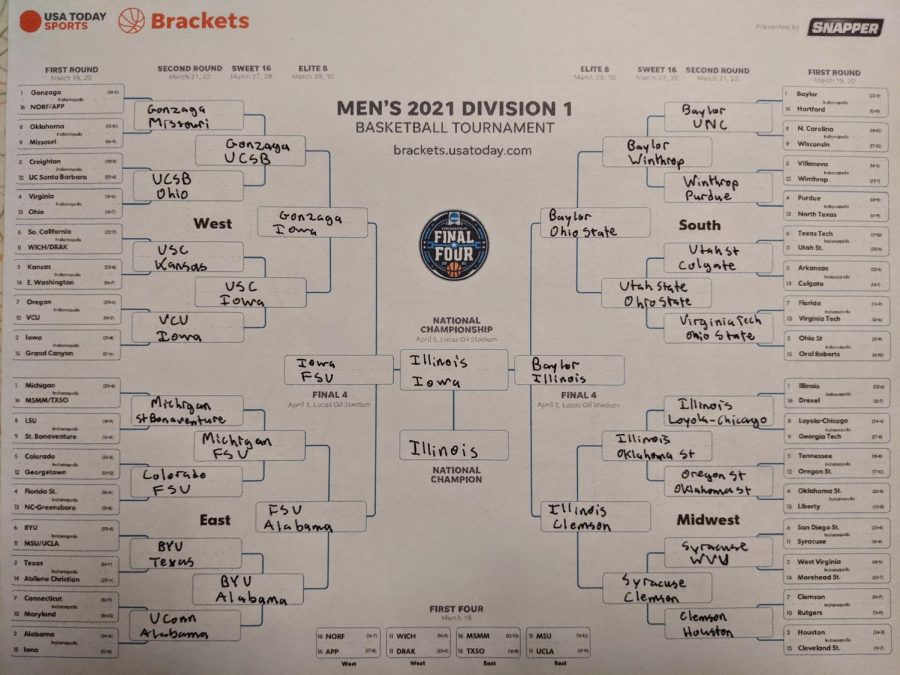3 tips for a better March Madness Bracket
Brackets lock on March 19, so if you want to make some last-minute edits, here are a few quick guidelines.
My completed 2021 March Madness bracket.
March 19, 2021
The Big Dance. The NCAA Men’s Basketball Tournament. MARCH MADNESS. Whatever name you have for it, it’s here. Along with watching 63 glorious, action-packed games, the process of filling out a bracket has been a huge yearly tradition for millions of fans, and the stakes are always incredibly high. Of course, predicting every game correctly is nearly impossible, as there are over 9.2 quintillion possible combinations for filling out a bracket, and sometimes, a shocking upset like 16-seed UMBC over 1-seed Virginia in 2018, will wreck your chances at winning anything. However, if you want to get some bragging rights over your friends, or even a little money, here are 3 tips to make your bracket a bit more accurate.
Tip 1: Don’t take your “Cinderella” teams too far
Sometimes, we tend to go crazy with upsets; take it from someone who had a 7th-seeded Cincinnati in their championship game in 2019, and then watched them lose in the first round. Sometimes, you find a team that you’re really confident in, and despite expert analysis and objections from your peers, they find their way into the later rounds of the tournament. Of course, this has worked out in years past; take Loyola-Chicago’s Final Four Run as an 11 seed in 2018. However, that miracle run was only the 4th of its kind since the tournament expanded to 64 teams in 1985, and it’s not likely to happen again anytime soon. Once you get into the second round of the tournament, teams seeded 9 to 16 only win around 28 percent of the time. In the Sweet Sixteen, that percentage drops to 25. The later you get into the tournament, the disparity between higher and lower seeds becomes more and more obvious. In the Elite Eight, 1 and 2 seeds account for 86 wins, while teams seeded 3 to 16 have only 54 wins. No team lower than an 8 seed has ever won a championship. This tournament is ruled by the elites, whether you like it or not, so be careful when taking your upset picks to later rounds. Even in a tumultuous year like this, the dominance of top teams is sure to be a constant.
Tip 2: #1 seeds are there for a reason. Pick them.
Teams with number 1 seeds have won 22 of the past 35 NCAA championships, as well as 11 of the last 13. Their historical dominance is nothing short of incredible, and it is consistent. Since the 64-team expansion, they have won 79 percent of their total games, nearly 10 percent better than any other seed. They have made 57 Final Fours and 34 championship games. What all of these statistics mean is that picking a 1 seed, even if it may seem boring, will get you return on investment. Often, we see a lot of brackets discounting these top teams simply because their prowess makes them well-hated. Don’t get me wrong, I love a little bit of fan bias. If you want to win your bracket group, though, picking with your emotions is not the way to go. Nearly 40 percent of brackets at CBS Sports have Gonzaga, the overall number 1 seed, as their winner, and while it may be tempting to break off from the majority, that decision is unlikely to serve you well. Also, one last thing: don’t pick a 16 seed over a 1 seed. Just don’t.
Tip 3: When in doubt, pick a 12-5 upset
If you’ve ever filled out a bracket before, or even watched a college basketball game, I’m sure you’ve heard of this phenomenon before. For some reason, 12 seeds enjoy unlikely success in the first round of the NCAA tournament, despite facing a team seeded much higher than them. Consider this: since the 5 seed vs 12 seed matchup was made possible by bracket expansion in 1985, only 5 years have gone by without at least one of these upsets happening. In 2019, this trend reached a whole new level, as Murray State, Liberty, and Oregon all beat 5 seeds in the first round. Perhaps the popularity of this game comes from the middle ground it shares between being a major upset and being close enough that either team could reasonably win. Either way, if you don’t pick any of these upsets, you’re on the wrong side of history. In 2021, it’s no different; all 4 of this year’s 5 seeds will face major challenges. Colorado will play Georgetown, who despite being ranked least likely to win the Big East in a preseason poll, rallied under coach Patrick Ewing’s lead to take home the title. Villanova is matched up with Winthrop, the champion of the Big South conference, and they will take the court without star guard Colin Gillespie. A Tennessee team that has suffered inconsistent play all season will have to face a red-hot Oregon State squad who just won the Pac-12 championship. Lastly, Creighton will take the court against Big West champion UC Santa Barbara after being blown out by the previously mentioned Georgetown Hoyas in their last game. I’m not saying the 12 seeds will sweep their opponents. I’m just saying these games will be closer than you expect.
However you fill out your bracket, I’m not going to judge you. You could go by seed, mascot, or even alphabetical order for all I care. I’m just here to nudge you in the right direction.



